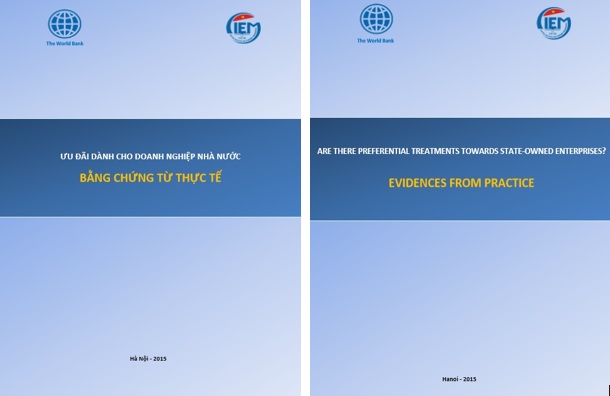
State owned enterprises (SOEs) constitute a significant economic sector in Vietnam. Before the market-based reforms introduced in the end of the 1980s, it was virtually the only formal economic sector which produced industrial goods or delivered services. With the rapid development of the domestic private enterprises and FDI, the SOEs have gradually lost their monopoly position and been increasingly forced to compete on equal footing with their private peers. Nevertheless, numerous strategic papers, notably the recently promulgated Constitution, continue to declare a leading role in the economy for the state sector. While these papers also state clearly that there are no differential treatments of enterprises from different ownership backgrounds, there are concern about existence of unequal treatments that may be associated with the leading role of the SOEs, their connection to policy makers or simply a remaining habit from the command regime.

The paper investigates whether the SOEs continues to receive preferential treatments by reviewing both the regulatory framework and practical evidence. Removing unequal treatments between SOEs and private firms is at the core of SOE reform in Vietnam. This will impose more competitive pressure on the SOEs and result in improved performance.
Essentially, there are double major challenges to the success of the SOE reform. First, change in the mindset is critical given the SOEs continue to be viewed as leading sector of the economy. It can take years or even decades to change the mindset and attitude towards the SOEs, from being the only economic sector in a command economy to one of several sectors in a level-playing field business environment. Changes in the mindset have been reflected in changes in the regulatory framework which display significant improvement over time.
The second major challenge is the implementation of well-intended reform measures. In particular, weak enforcement is often a decisive factor behind the slow and at times ineffective transformation of good policies to real progress. The SOE reform is not an exception and the paper aims to illustrate the (in)effectiveness of implementation in SOE reform by documenting evidence of deviation of practice from regulatory framework. This study is prepared by Le Duy Binh (Economica Vietnam) and Doan Hong Quang (the World Bank) with contribution of Nguyen Thuy Nhi and Truong Duc Trong (Economica Vietnam) under the framework of the Bank-executed Trust Fund (BETF) which aims to make contribution to improvement of the enabling nature of the state in Vietnam’s market economy. The BETF was co-implemented by the World Bank and MPI (particularly by MPI’s research institutes including CIEM, DSI, NCIF and APD).
To download the papers, please go to the Resource Centre of this website.